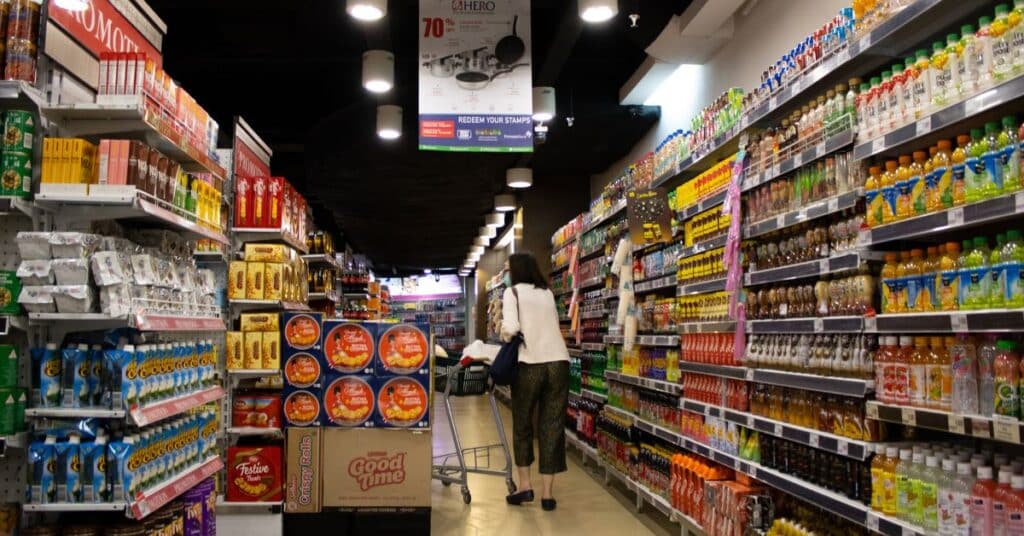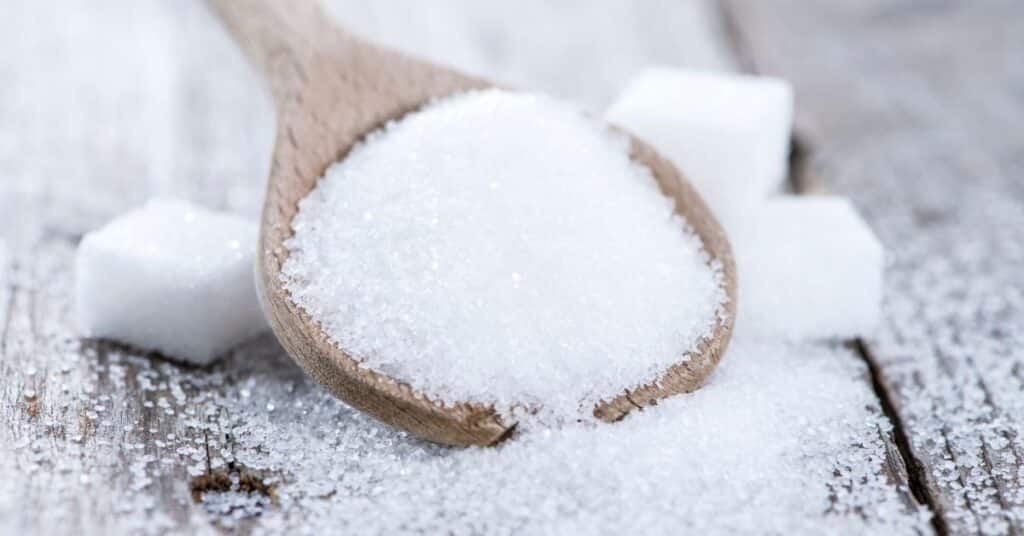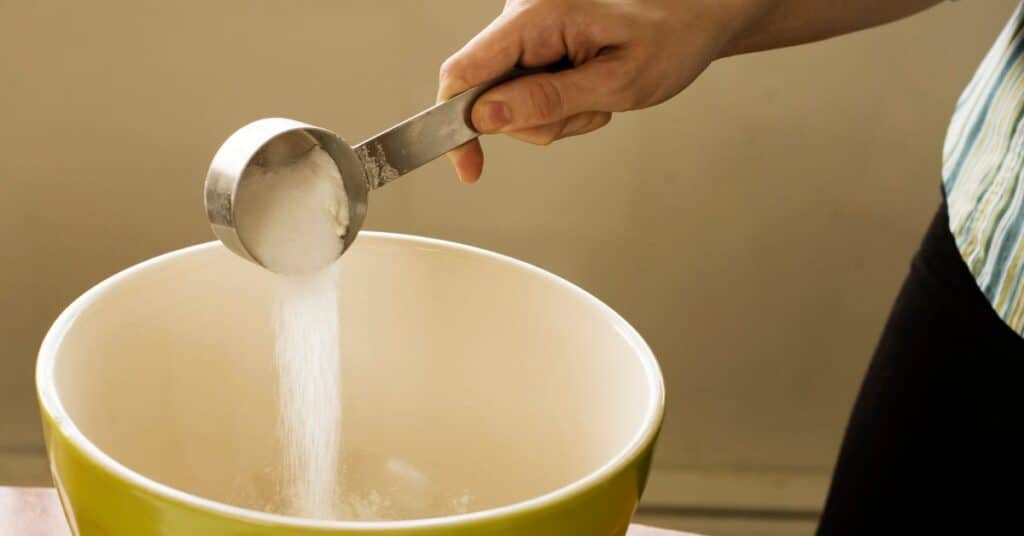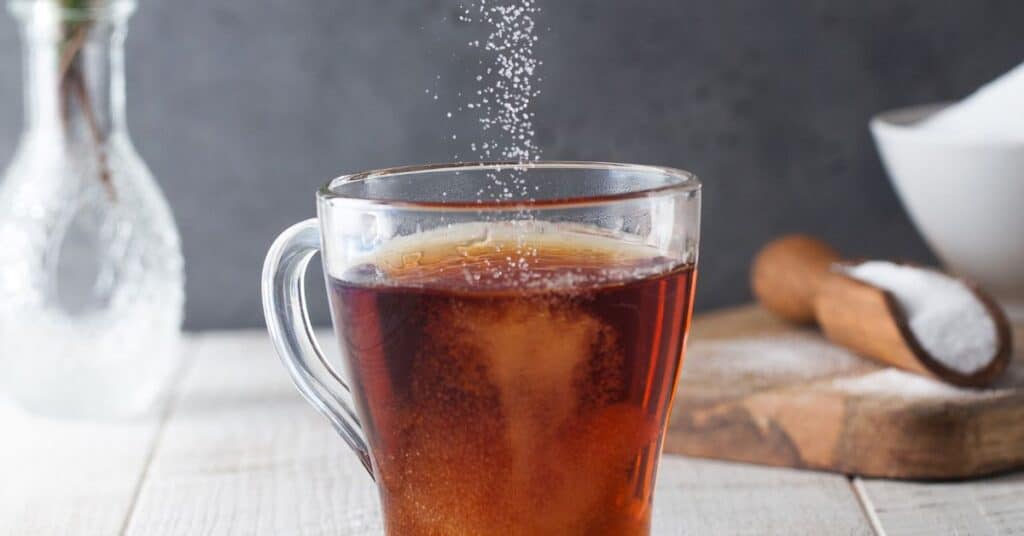Sucralose, a common artificial sweetener, is found in items ranging from beverages to yogurt and often seen as a sugar replacement for coffee, tea, or baked goods. But recent studies have made the answer to the question “Is sucralose bad for your gut?” more clear. There is of course a need for further research and long-term studies. We always need more research, right? We’re humans, we’re limited. We always need to increase our understanding of things. So I think that’s definitely called for here. But where do we go from here with this information?
*This is a modified transcript of an episode from my podcast, The Nourished & Thriving show. This episode is titled “The Bittersweet Truth: Examining the Potential Harm of Sucralose on Gut Microbiome”, which you can find on your favorite listening platform here.
*This is not medical advice.
First things first, I’m a registered dietitian on a mission to help you increase your impact and legacy on the world while healing your gut and reducing your IBS symptoms. My goal is to inspire you to live vibrantly and provide valuable resources and information that empowers you to take bold action towards your health goals.
I really wanted to speak to something that I’ve been seeing all over social media as of late, particularly in the healthcare and nutrition world. So today I’m gonna lift the veil on the topic of Splenda or sucralose. You have heard of it. You have seen it. Today we’re specifically talking about its impact on gut health and overall health, because we know that anything that affects our gut affects all of us, right? Our bodies, our systems of systems, we are all connected. Everything is connected.
Here’s the big question: do artificial sweeteners (like Splenda) have a hidden cost? Is sucralose bad for you and your gut? To answer that, I’m going to go through some conflicting studies and talk through them, with the angle of gut health specifically.

If it’s on a supermarket shelf, it’s safe for us to use or consume… False.
Put simply, Splenda is an ingredient on the shelf. It’s been sold for over a decade now, right? The problem is that there’s a huge misconception that something being sold on a shelf is completely safe for our health. More and more, this is something people are starting to realize, but for so long we’ve really trusted companies. We trusted the government too. We expect safe products, and I think as we navigate through this period of time, where consumers are becoming more educated and more aware about what they’re putting in and on their bodies and the science as it’s becoming more accessible thanks to the worldwide web and podcasts and social media, we’re starting to see a shift. People are starting to realize it’s not as black and white and straightforward as we would like it to be. And the same is true with Splenda. So I want to dive a little deeper here. How are ingredients that are being sold not safe?
Let me begin with my background – I worked in the food industry for five years, so I am very well versed in how the food industry works with regulations and all of that. In the USA’s procedures, any new chemical that hasn’t been used in food before has to apply and has to have studies backing it up to prove its safety before it can get put onto shelves. But remember the company itself is trying to prove it’s safe, so they do everything they can to do that. Their motive is to sell their product. They also have a problem they want to solve, and they think they have a solution for it. It’s not all malicious. It’s not like this “big bad” corporation is thinking, “how can we poison Americans today?” But they do have an angle and a vested interest in getting their product onto a supermarket shelf. So in the case of Splenda, the studies to prove its safety were done over a decade ago now. We knew a lot less back then than we know now about our bodies and science. Our understanding was limited. So that’s why you’ll see studies saying one thing 10 years ago, and then today you’ll see it trending in a different direction.
With any research, it’s difficult to zoom out and look at the entire situation as a whole. Scientists can’t have too many variables because they can’t measure a million different variables. If you try, you’re not going to be able to make conclusions with your results. Therefore, by default scientists have to have a very strict set of conditions with very limited, controlled variables so they can prove something. But then, the entire story doesn’t get told. And I once again want to return to our limited understanding as humans. We’re just limited, right? Doesn’t mean we’re malicious or bad, we’re just limited. So with that all said, I’m going to walk you through some of it today and try to break it down as best as I can. Specifically this new study that just came out a month ago.

What is sucralose? And what are the benefits of artificial sweeteners?
Sucralose or Splenda is an artificial sweetener. The benefit of it is reduced calories and sugar in American’s (and the world’s) diets. This is especially important as we’re struggling with an obesity epidemic, and we know that risk of chronic disease and quality of life goes up whenever you’re struggling with obesity. On top of that, we have major issues with blood sugar control, especially as we get older and we’re even seeing insulin issues and blood sugar issues trickle down into our kiddos now. We have a huge issue on our hands, and that is the problem these artificial sweeteners are working to solve.
A lot of us crave sweet things, but we don’t want to deal with all of the negative health consequences. Splenda is something that was brought to the market to do just that. You could add it directly to beverages like coffee or tea, and you could even bake with it! But new research is showing sucralose might be affecting our gut microbiomes.

What is the gut microbiome?
The gut microbiome is all the different organisms that live in and on our bodies. They help with digestion, immunity, overall health, and supporting the structure and function of our gut. The health of your gut is very important, since as Hippocrates said, all disease begins in the gut. The gut plays a role in our hormones, our inflammation levels, and our immune systems. It is literally the gatekeeper keeping bad things out and letting good things into our body. If it’s not working right, your whole body is not working right. So know, the gut is important!
2023 Sucralose Study
Let’s dig into some of the studies. So I already said, studies came out late May 2023 showing that an impurity of sucralose is genotoxic. Genotoxic means it damages our DNA. Now the studies done over ten years ago said the opposite. So what gives? Like we talked about before, science has changed, the variables change, things they’re testing against change, and that’s what we’re seeing here. So let’s focus on the 2023 findings….

This study investigated sucralose and sucralose-6-acetate, which is an impurity from the manufacturing process of Splenda. The company is making Splenda (a sucralose product), and as they’re making it sucralose-6-acetate is also formed. So much so that it is measurable in the finished product. Also, this study showed that sucralose-6-acetate was formed in the gut as sucralose is broken down by the body. They were able to show this by testing fecal samples after people consumed sucralose and found that the chemical was present at higher amounts than what was present in the product before it was consumed. This chemical, sucralose-6-acetate, is what is the issue at hand. Not to say sucralose doesn’t play a part in it, but we’re specifically examining sucralose-6-acetate.
So sucralose-6-acetate was found to be genotoxic in this study. In the initial study ten years ago they said sucralose was not genotoxic – that study looked at sucralose itself, not this byproduct. But now we realized we need to take a look at this impurity and found it is causing harm to our bodies. How so? Sucralose-6-acetate was found to break our DNA strands (a.k.a. genotoxic).
Then upon further investigation, sucralose itself and the sucralose-6-acetate were both found to increase intestinal permeability. If you’ve heard of leaky gut, that’s what intestinal permeability is. Leaky gut increases the inflammation in your gut as well as the rest of your body. A lot of chronic issues can happen from this, including possible issues with hormone regulation.
Moreover, the sucralose-6-acetate was shown to increase the expression of genes. It didn’t specifically cause it, but it increased the expression of these genes that are causing inflammation, oxidative stress, and cancer. That’s a big NO for me.

What now? Is sucralose bad for your gut?
So what do we need to do from here? Like I said, you study different things with different variables, you get different results, but for me this study is really huge. There is of course a need for further research and long-term studies. This information is for edutainment. I am not giving you health advice because I’m not your provider, unless you’re one of my clients. Is sucralose bad for your gut? Right now, based on the most recent studies, very real effects are being caused by sucralose. In my family, to my clients, to myself, I do not recommend Sucralose. So do what you want with that. Make your own decisions. Dig into the research if you want and decide what you need to do. My personal conclusion: Sugar intake isn’t good for health and neither are artificial sweeteners.
Unfortunately, we can’t hack nature, especially if something sounds too good to be true. We need to continue to enjoy treats as treats – something that we get on special occasions or to reward ourselves while we maintain healthy, whole food diets. If you are someone struggling with sugar cravings, I get it. I used to have a humongous sweet tooth myself. But your taste buds can change as you start to change your eating habits and change your microbiome and improve your gut health, you’ll find that those sweet things or those artificial sweeteners honestly taste awful and overly sweet. As you start to change the way you eat, change your taste buds, change your microbiome, you start to crave the more complex flavors of whole foods. So hang in there, make those changes slowly over time as you’re able and you’ll get there. Just stay consistent and informed.
I’m always here to break things down for you and help you navigate all of this, because I know it can be really confusing. Let me know what questions you have about this or other research studies that you’ve heard about.


